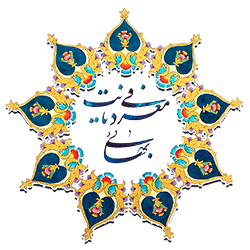But the purpose of these verses is not what they have imagined. Nay, the terms “ascendancy,” “power,” and “authority” imply a totally different station and meaning. For instance, consider the pervading power of those drops of the blood of Husayn which besprinkled the earth.
What ascendancy and influence hath the dust itself, through the sacredness and potency of that blood, exercised over the bodies and souls of men! So much so, that he who sought deliverance from his ills, was healed by touching the dust of that holy ground, and whosoever, wishing to protect his property, treasured with absolute faith and understanding, a little of that holy earth within his house, safeguarded all his possessions. These are the outward manifestations of its potency. And were We to recount its hidden virtues they would assuredly say: “He verily hath considered the dust to be the Lord of Lords, and hath utterly forsaken the Faith of God.”
“باری، مقصود نه چنان است که ادراک نمودند بلکه مقصود از غلبه و قدرت و احاطه مقامی ديگر و امری ديگر است. مثلاً ملاحظه فرمائيد غلبه ترشّحات دم آن حضرت را که بر تراب ترشّح نموده و به شرافت و غلبه آن دم، تراب چگونه غلبه و تصرّف در اجساد و ارواح ناس فرموده. چنانچه هر نفسی برای استشفاء به ذرهّ ای از آن مرزوق شد شفا يافت و هر وجود که برای حفظ مال قدری از آن تراب مقدّس را به يقين کامل و معرفت ثابته راسخه در بيت نگاه داشت جميع مالش محفوظ ماند. و اين مراتب تأثيرات آن است در ظاهر و اگر تأثيرات باطنيّه را ذکر نمايم البتّه خواهند گفت تراب را ربّ الارباب دانسته و از دين خدا بالمرّه خارج گشته.”
استشفاء: طلب شفاء کردن/ مرزوق: به رزق رسیده، به روزی رسیده/ بالمره: به یک باره، قطعاً

